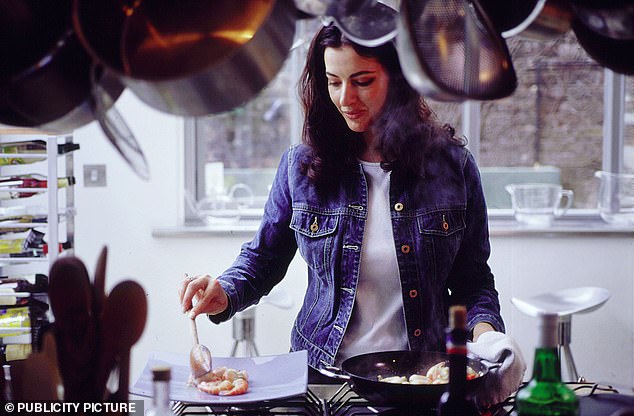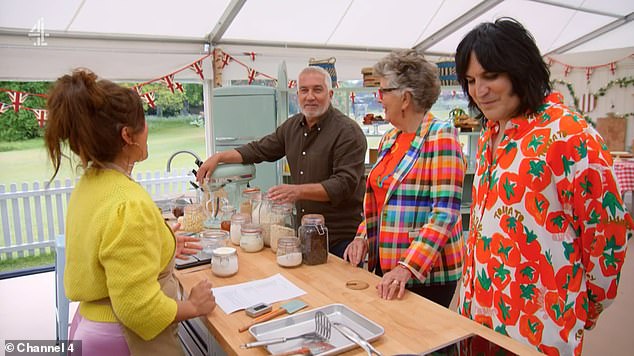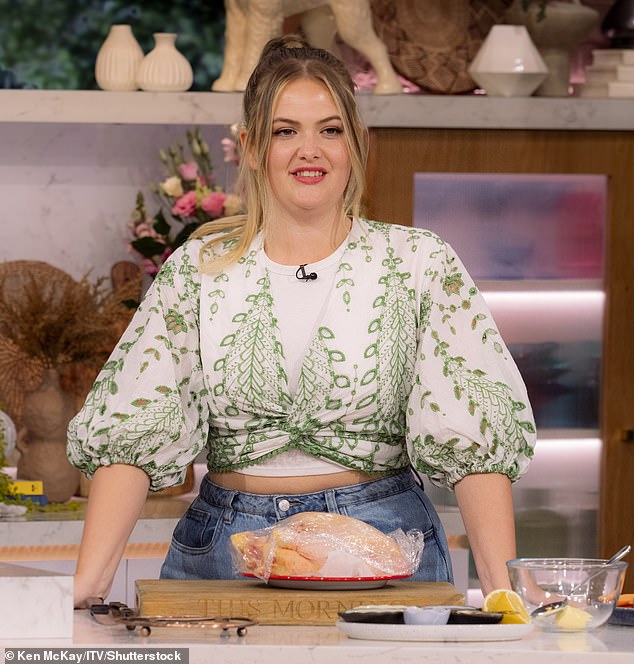Gone are the days that Saturday mornings would be filled with the hum of Nigella Lawson or Rick Stein telling viewers how to best mash potatoes or fillet fish – for the traditional ‘food show’ is now being axed in favour of quick social media ‘shorts’ amateur chefs can look up on demand, as they wish.
While a primetime slot, or even just a cosy contract with a network, used to be the ultimate pipeline to culinary celebrity, it’s now all about carving out a name for yourself with Instagram, and TikTok reels.
Competitions like the Great British Bake Off or authentic laid back viewing like Saturday Kitchen may still be thriving – but when it comes to informational content, audiences want easy, accessible, and curated.
Think Poppy O’Toole – of Poppy Cooks fame – who during the pandemic became a viral sensation after dubbing herself a ‘Potato Queen’, focusing on recipes exclusively with the vegetable.
Now, she boasts a whopping 4.8 million followers on TikTok.
Elsewhere, Mob Kitchen, a popular channel for food ‘inspo’ online has 1.5 million followers on the app, and a dedicated cult status.
Other contenders include Sorted Food (111,000 followers), Alexandra Dudley (183,000 followers) and Ks_Ate_Here (138,000 followers).
‘In their heyday, cooking programmes on TV were in huge demand and they made global stars out of the chefs appearing on them,’ Dylan Davey, Brand Strategist and Founder of The Social Inc, told the Daily Mail.

Gone are the days that Saturday mornings would be filled with the hum of Nigella Lawson (pictured) or Rick Stein telling viewers how to best mash potatoes or fillet fish – for the traditional ‘food show’ is now being axed in favour of quick social media ‘shorts’ amateur chefs can look up on demand, as they wish
‘For the best part of 20 years they reigned, but in the past year there has been a 44 per cent drop in new commissions across all food show formats, according to data.’
He explained that while social media’s rising relevance definitely plays a part -YouTube is the biggest channel for cooking content across social platforms – there is also a disenchantment with the format.
‘Cooking shows became like reality TV,’ he added. ‘When reality formats exploded, the same competitive and live elements were channelled into the cooking world.
‘For a long time it worked, but at some point audiences became fatigued – there was too much choice and things didn’t feel as fresh anymore.’
Dylan shared how the online world has, in the meantime, had an opposite rebrand and began to be taken more seriously by studios and kitchens alike.
‘What once felt gimmicky or throwaway has evolved into polished content that audiences trust and enjoy,’ he explained.
‘Over the past 10 years there has been a steady rise in food influencers who have slowly taken the market share of the traditional TV chefs’ pie.
‘They have been competing for years, and in some ways their worlds have collided. TV chefs have had to up their game on social media, which worked well for a long time.

Competitions like the Great British Bake Off or authentic laid back viewing like Saturday Kitchen may still be thriving – but when it comes to informational content, audiences want easy, accessible, and curated
‘Food influencers like Joe Wicks have successfully transitioned into the mainstream, and now there are thousands covering every type of cuisine you can imagine. TV can still have huge impact if it gets the ingredients right – but finding the right mix of talent, timing and format is more complex than it used to be.’
Elsewhere, David Moore, co-owner of Pied à Terre in Fitzrovia, said there is a greater paradigm change at play too.
‘I think the way people learn to cook and where they’re looking for that information has changed, so there’s less of an appetite for the kind of ‘cookery class’ television that used to be so popular,’ the restauranteur remarked.
‘More and more, people look for short, follow-along YouTube or TikTok tutorials for a specific recipe, rather than wanting to sit through a half-hour TV show in case something catches their eye.
‘It stands to reason that production companies and TV channels won’t want to invest in making something people won’t want to watch.’
What’s more, a social media format makes it much easier to curate content around ‘trends’ – and much quicker to turn around than a programme.
Take air fryer recipes, overnight oats, ‘what I eat in a day videos’ or ‘girl dinner’ inspo – all are content ideas which can be swiftly filmed, edited and engrained into the algorithm.
However – this isn’t too say that food TV is completely in the bin. Standout acts still remain.

Poppy O’Toole – of Poppy Cooks fame – who during the pandemic became a viral sensation after dubbing herself a ‘Potato Queen’, focusing on recipes exclusively with the vegetable
‘The most successful shows, and the ones which continue to thrive, are shows which combine food content with other entertainment,’ David explained.
‘The appetite for “chop and chat” shows where it’s just a cook, cooking, has diminished, but people still love shows where food is part of a wider package, with interviews and entertainment alongside it – like Saturday Kitchen and Sunday Brunch, and to an extent, With Love, Meghan.
‘And of course we still love food competitions – witness the enduring popularity of Great British Bake Off and the various versions of MasterChef.
‘These are now globally popular, and are watched as much for the human stories and drama as the actual cooking element.’
Dylan agrees that culinary programming is far from being completely over – but it is now a much more deliberate market.
No longer, it appears, will viewers have the problem of having to endure 21 hours of cooking show content (a complaint the BBC reportedly had).
‘Cooking shows on TV will still exist, but they will be more seasonal and intentional,’ he said.
‘The everyday cooking programme has lost its momentum, but audiences are still drawn to key moments – for example, Christmas specials or one-off event shows. If a programme can tap into those viewing habits with the right talent and concept, it can still be a big hit.’
‘The future will be more niche, seasonal and event-driven, with fewer long-running, everyday cooking formats,’ he continued.
‘Social media will keep driving day-to-day food inspiration, but TV still has the power to create big cultural moments. The difference now is that the bar is higher – the story, the talent and the format all have to be spot on.’
When it comes to carving out a name in the world of cooking in the wild west of the internet however, David said, the bar is high.
‘Obviously personality is important – people find influencers more relatable, more “like them” than a lot of the chefs and cooks they see on TV – but I think for many their success lies in the kind of content they produce rather than who they are,’ he said.
‘If it’s short, clear, easy-to-follow and looks good on social media, then it has a good chance of going viral. Traditional food TV just doesn’t go viral in that way; you can’t repost a TV show, or forward it to all your friends in one click.’
One successful example is Joe Wicks, whose catchy ‘And that’s Lean in 15!’ soared him into post-social media fame.
‘Fifteen minutes feels like an incredibly long time now compared to some two-minute TikToks, but he was the pioneer of short-format recipe content on YouTube I’d say.
‘For me the ones to watch are the influencers who have a genuine passion for, and knowledge of, their subject, rather than the many who’ve taken to food only because they know it gets views.
‘People like Melissa Thompson and Gurd Loyal are both experienced cooks, writers and broadcasters who also create great social media content – they’re not trying to be influencers, but they are influential.
‘I love the huge care and effort Alexandra Dudley and Camille Kenny-Ryder put into the quality of their photos and videos on Instagram; they combine a stunning aesthetic with really knowledgeable content, which isn’t the case with some influencers who might manage one or the other but never the twain.
‘Kar-Shin Tong (KS Ate Here) is brilliant, he just so clearly absolutely loves restaurants and the people who work with them, and he creates high-energy content that just jumps off the screen.’